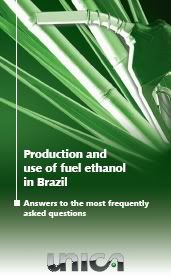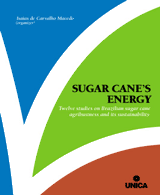Two handy books answer FAQs on Brazilian ethanol
 UNICA, the São Paulo Sugarcane Agroindustry Union, has produced two handy books answering some common questions about Brazil's sugarcane and ethanol industry. The publications are made available to larger audiences in the context of the upcoming Ethanol Summit 2007, to be held in São Paulo early next month.
UNICA, the São Paulo Sugarcane Agroindustry Union, has produced two handy books answering some common questions about Brazil's sugarcane and ethanol industry. The publications are made available to larger audiences in the context of the upcoming Ethanol Summit 2007, to be held in São Paulo early next month.In Production and use of fuel ethanol in Brazil - Answers to the most frequently asked questions Unica's consulting group takes the reader through all aspects of the production of sugarcane to its transformation into liquid biofuels and green power. For Sugar Cane's Energy, Twelve studies on Brazilian sugar cane agribusiness and its sustainability, Isaias de Carvalho Macedo condensed the insights of leading researchers and scientists, producers and officials related to Brazil's ethanol industry into a more in-depth panorama of the complex interactions between the biofuel sector and the environment, society and the economy.
It must be said, UNICA is the voice of the sugarcane agribusiness establishment. Its views on the social dimension of the sector can be safely called conservative, in that it mainly points to the employment opportunities it generates without dwelling on broader issues of the 'political economy' of modern agribusiness as such (ownership issues, struggles over land, social inequalities fuelled by a system that dates back to colonial times...). Other voices are far more critical in this regard. That said, the books offer a good introduction to the sector.
State of the industry: past, present and future
In a first part, the 'FAQ book' places Brazil's success story in the global context of the search for alternatives to petroleum. It discusses the energy balance of the fuel and the evolution of the volumes produced over the course of the years. The question which cars can use what kind of ethanol blend, and how the development of flex-fuel vehicles has changed the equation is answered.
An overview of the history of sugarcane growing and ethanol production in Brazil is provided, with an in-depth discussion of the National Alcohol Program (PROÁLCOOL) launched in the 1970s and how the State gradually withdrew from sugar-cane agribusiness activities. A quick look at whether the current regime for sugarcane, sugar and ethanol is compatible with the regulations of the World Trade Organization (WTO) is offered too. It shows which players use unfair trade practices, such as subsidies, trade barriers and dumping - and what Brazil's position is in this context.
Those interested in learning more about what it takes to set up an ethanol plant in the country are served: a section looks at the institutional and economic aspects of the industry, at its taxes, incentives and rules. Current land use and plans for expansion of sugarcane growing, with an eye on exports, are discussed as well, and include projections to 2012.
Environmental sustainability
In the second part of the book, the environmental and sustainability aspects of sugarcane and ethanol production are presented: soil and land use, the effects of expansion on food growing and protected areas, and the environmental laws dealing with the different steps and products in the production chain (burning residues, use of bagasse and vinasse, emissions and pollution regulations for bagasse powered boilers, and so on.)
An interesting section covers the questions on the conservation of soils and water resources, on the utilization of agrochemicals and fertilizers, agricultural practices, and the management of industrial waste streams.
A good overview of the greenhouse gas (GHG) balance of the fuel over its entire lifecycle as well as the direct emissions from using it in vehicles is provided. A comparison of the GHG balance of sugarcane based ethanol and the corn based variant shows the considerable difference between both fuels:
 bioenergy :: biofuels :: energy :: environmental sustainability :: social sustainability :: sugar cane :: ethanol :: biomass :: Brazil ::
bioenergy :: biofuels :: energy :: environmental sustainability :: social sustainability :: sugar cane :: ethanol :: biomass :: Brazil :: Social sustainability
An important chapter is entirely devoted to the social impacts of the ethanol industry in Brazil. This is an issue that is receiving a lot of attention from both the government as well as civil society organisations.
Current labor legislation in the sugar-cane agribusiness is discussed in the book, as well as the role of unions and the mechanism in use in Collective Bargaining Instruments.
The Brazilian sugarcane and ethanol industry is not static, as relations between capital and labor change continuously. Some of these evolutions are highlighted in the book.
The sector now employs around 700,000 workers, with many more indirect jobs generated. An overview of Brazil's current labor market and the role of the biofuel sector in it is provided. The question as to how employment levels are expected to evolve in the face of increasing mechanization and automation is adressed.
Bioenergy technologies
The closing chapter of the handy book offers an basic look at current bioconversion technologies for the production of ethanol. Some scenarios on how these technologies may evolve are included.
We earlier pointed to the fact that Brazil succeeded in reducing ethanol production costs over the course of 30 years by up to 75%. The book looks at this trend and shows how it may continue.
 In Sugar Cane's Energy, Twelve studies on Brazilian sugar cane agribusiness and its sustainability, twenty-three professionals from several fields have directly contributed texts either on the national or international context or, specifically, on aspects of the sugar cane agribusiness in Brazil. Isaias de Carvalho Macedo condensed their insights and bundled them into twelve chapters.
In Sugar Cane's Energy, Twelve studies on Brazilian sugar cane agribusiness and its sustainability, twenty-three professionals from several fields have directly contributed texts either on the national or international context or, specifically, on aspects of the sugar cane agribusiness in Brazil. Isaias de Carvalho Macedo condensed their insights and bundled them into twelve chapters.The author chose to group the topics by the type of impacts of the biofuel sector on different segments of society, as follows: the 'Impacts on the use of material resources' (energy and materials); the 'Impacts on the environment' (air quality, global climate, water supply, soil occupation, biodiversity, soil preservation, use of pesticides and fertilizers); the 'Sustainability of the agricultural production base', including resistance to pests and diseases; the 'Impacts on commercial actions', covering competitiveness and subsidies; and, in conclusion, some 'Socioeconomic impacts', with great emphasis on the creation of jobs and income.
More information:
Both publications can be downloaded for free at UNICA's website.
Isaias de Carvalho Macedo, Twelve studies on Brazilian sugar cane, agribusiness and its sustainability [*.zip/*.pdf format; in English and Portuguese], São Paulo Sugar Cane Agroindustry Union, São Paulo, 2005.
UNICA Consulting Group: Production and use of fuel ethanol in Brazil - Answers to the most frequently asked questions [*.pdf], São Paulo Sugar Cane Agroindustry Union, São Paulo, March 2007.
 --------------
--------------
 Spanish energy and engineering group Abengoa will spend more than €1 billion (US$1.35 billion) over the next three years to boost its bioethanol production, Chairman Javier Salgado said on Tuesday. The firm is studying building four new plants in Europe and another four in the United States.
Spanish energy and engineering group Abengoa will spend more than €1 billion (US$1.35 billion) over the next three years to boost its bioethanol production, Chairman Javier Salgado said on Tuesday. The firm is studying building four new plants in Europe and another four in the United States.








0 Comments:
Post a Comment
Links to this post:
Create a Link
<< Home